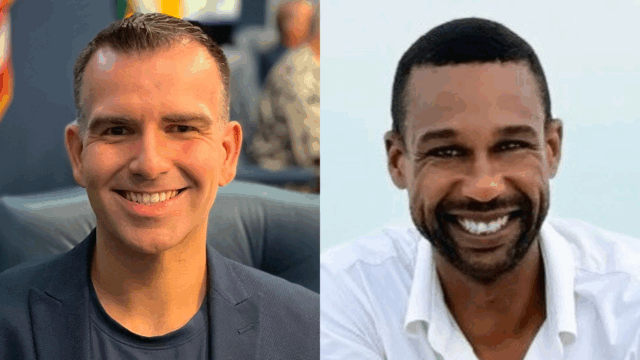Early voting is underway in Miami Beach, where voters are choosing a Mayor and three city Commissioners in an election that could reshape the city’s governance and relationship with Tallahassee.
At stake on Nov. 4 are four of the seven seats on the dais — a potential governing majority — in a city confronting turbulence on multiple fronts: state scrutiny over finances, charges that a local ordinance conflicts with Florida’s homelessness law, the removal of cultural landmarks due to their so-called “woke” significance and accusations of pay-for-play policymaking that benefits developers.
Amid the tension, residents are weighing how the city should balance order, affordability and its international image.
All commission seats are elected at-large, meaning every voter can weigh in on each race. If no candidate in a commission race wins a majority, the top two advance to a Dec. 9 runoff.
Early voting runs through Nov. 2.
Mayor: law and order vs. rebuilding tourism
Two familiar figures are facing off for Mayor: incumbent Steven Meiner, a former federal government lawyer and ex-Commissioner, and Kristen Rosen Gonzalez, a sitting Commissioner, Miami Dade College professor and longtime preservation advocate.
Meiner is running on a “law and order” platform highlighting his crackdown on Spring Break mayhem, work to reduce recidivism by successfully prosecuting criminals and efforts to keep flood control projects on track.
He’s also touted a recent property tax rollback that he calls proof of fiscal discipline.
“My commitment remains to make Miami Beach the best and safest city in America,” he said in an Oct. 10 campaign video. “Major crimes are down 15.5% across Miami Beach. This represents real improvement for your daily safety and peace of mind.”
Rosen Gonzalez agrees the city regained control but says Meiner’s clampdowns have driven away tourists and small businesses. She told Local 10 this month that year over year, Miami Beach is down $4 million in tourism tax revenue, which represents $100 million in economic activity.
“We told the entire world not to come to Miami Beach,” she told WSVN. “But we’ve never really told them to come back.”
Accordingly, Rosen Gonzalez’s platform centers on reviving tourism. She also wants to cut red tape for local businesses, foster more affordable housing and improve the city’s transit provisions.
Both supported the city’s 2023 homelessness ordinance that allows police to arrest people sleeping in public after shelter offers are refused. Both want a long-floated water taxi link between Miami and Miami Beach,
The two have also sparred over crime statistics. Meiner cites mid-year police data showing overall crime down and a successfully prosecution rate of 92% since 2022. Rosen Gonzalez insists aggravated assaults are up. In early August, she posted and then quickly deleted inaccurate crime data.
 (L-R) Mayor Steven Meiner and Commissioner Kristen Rosen Gonzalez, who is running to unseat him. Images via the candidates.
(L-R) Mayor Steven Meiner and Commissioner Kristen Rosen Gonzalez, who is running to unseat him. Images via the candidates.
Each candidate has faced controversy. Meiner drew national criticism for trying to evict a nonprofit theater in the city after it screened the Oscar-winning documentary about the Israel-Palestine conflict, “No Other Land,” which he called antisemitic and a public safety issue.
He ultimately withdrew the measure.
Meiner is also battling a lawsuit an anti-Israel Jewish activist group filed against Miami Beach and its officials alleging he stifled pro-Palestinian protests. Last year, he resigned from his job as a lawyer for the US. Securities and Exchange Commission amid an internal investigation into allegations of sexual harassment against him.
Rosen Gonzalez, meanwhile, has been the subject of five ethics complaints — that led to no findings against her, faced a sexually charged defamation lawsuit that her insurer since settled and has a history of headline-grabbing moments, including comparing former Mayor Dan Gelber to Vladimir Putin and falsely calling herself Hispanic.
Notably, those issues happened years ago. Rosen Gonzalez told the Miami Herald that she is “wiser” and more collaborative now.
A poll Plantation-based MDW Communications conducted in May, before Meiner formally entered the race, showed Rosen Gonzalez leading the incumbent by 6 percentage points, though more than a third of respondents reported being undecided in the contest.
Meiner, a 54-year-old with no party affiliation, carries endorsements from Miami Mayor Francis Suarez, Suny Isles Mayor Laura Svechin, Miami Commissioners Joe Magazine and David Suarez, and former Miami Beach Mayors Dan Gelber and Philip Levine.
He also has support from the Miami Beach Fraternal Order of Police and Miami Beach firefighters union IAFF Local 1510.
Rosen Gonzalez, a 52-year-old Democrat and Miami Dade College professor, has endorsements from former Mayor Matti Bower, LGBTQ advocacy group SAVE Action PAC and several union groups, including AFSCME Florida, GSAF Local 100 and UNITE HERE Local 355.
In terms of fundraising, Rosen Gonzalez is the clear front-runner. Her campaign account reported raising $136,000 and $6,500 worth of in-kind contributions. The nearly $75,000 she spent through Oct. 3 was about $1,000 more than Meiner reported raising altogether.
Miami Beach’s elections are nonpartisan, but party politics frequently factor into races.
City Commission, Group 1
The contest for the open Group 1 seat — vacated by Rosen Gonzalez — is the city’s most crowded this year. It features six active candidates. A seventh, Matthew Gultanoff, suspended his campaign last week.
If no one wins more than 50% of the vote, the top two vote-getters will head to a Dec. 9 runoff.
Daniel Ciraldo, a former Executive Director of the Miami Design Preservation League and one of the most articulate opponents of a since-passed Florida law easing the demolition and replacement of older, sometimes historic structures, hopes to take his preservationist bona fides to City Hall.
He called over-development “the most pressing issue, threatening our quality of life, traffic and environment” in answers to a questionnaire the Herald sent candidates. If elected, he promised to defend historic districts, curb traffic-intensive projects, ensure transparency in zoning and “put residents — not special interests — at the center of city decisions.”
Ciraldo, a 42-year-old Democrat, raised about $107,000 between his campaign account and political committee, Our Beach Our Future. He’s also notched several community endorsements.
Real estate investor Brian Ehrlich, a former member of the city’s Historic Preservation Board and a Bass Museum trustee, pitched himself as a pragmatic modernizer.
“I see Washington Ave., Lincoln Road, 41st Street and Ocean Drive revitalized with energy and innovation,” he told the Herald.
But he’s also drawn scrutiny for developer-linked donations to his political committee, Miami Beach in Focus, which, together with his campaign account, raised $165,000 through the beginning of this month.
Ehrlich, 44, is a Democrat.
Realtor Ava Frankel, who switched from Republican to no party affiliation in 2022, is campaigning on a promise to bring new perspective to the dais and modernize the city’s infrastructure, particularly its flood-mitigation systems.
At 28, she’s the youngest person running for a Miami Beach elected post this year.
She reported raising about $10,000 through Oct. 3, nearly half of which came through self-loans and donors with “Frankel” in their names.
 (Clockwise from top left) Daniel Ciraldo, Brian Ehrlich, Ava Frankel, Omar Jimenez, Monica Matteo-Salinas and Monique Pardo Pope are running to replace Kristen Rosen Gonzalez on the City Commission. Images via the candidates.
(Clockwise from top left) Daniel Ciraldo, Brian Ehrlich, Ava Frankel, Omar Jimenez, Monica Matteo-Salinas and Monique Pardo Pope are running to replace Kristen Rosen Gonzalez on the City Commission. Images via the candidates.
Restaurateur Omar Jimenez, the founder of the Park View Island Sustainable Association and owner of Bella Cuba restaurant, cites firsthand success in securing $10 million for infrastructure upgrades to North Beach for sewer and stormwater systems, waterways and parks.
Cleaning up Miami Beach, specifically its waters, has been a focus of the 39-year-old independent’s for the better part of a decade, since a major sewer main break spilled 1.6 million gallons of raw sewage into public waters. He’s led beach cleanups for years.
“I work for the people, not lobby groups, special interests or developers,” he told the Herald.
He raised $25,000. Of that, $20,000 came from his bank account.
City employee Monica Matteo-Salinas, 46, earned the Herald’s endorsement for her grasp of policy and pragmatic proposals. A former aide to two sitting Democratic city Commissioners, Matteo-Salinas, a Democrat, vows to expand trolley service, pursue affordable housing purchases and establish a new “water czar” position in the city, paid by resort taxes.
She raised about $63,000 between her campaign account and a little-used political committee, Voters for Good Government, inclusive of a $25,000 self-loan.
Lawyer Monique Pardo Pope, 44, a Republican guardian ad litem and member of the city’s Commission for Women, has run a campaign emphasizing public safety, education and family services.
Of $166,000 she reported raising through her campaign account and political committee, Miami Beach Together, a third came from her bank account.
Pardo Pope’s candidacy drew attention late last month after documentarian Billy Corben revealed that she is the daughter of former police officer Manuel Pardo, a serial killer and Nazi enthusiast who was executed for killing nine people in the 1980s.
She said in a statement that she forgave her father for his crimes in order to move on with her life and dedicate herself to service. Despite the controversy, Pardo Pope earned endorsements from the Jewish-affiliated Teach Florida PAC, Miami-Dade Commissioner René García and former City Commissioner Jose Smith.
City Commission, Group 2
The race for the Miami Beach Commission’s Group 2 seat is the city’s most contentious this year.
Incumbent Laura Domínguez, a 54-year-old Democrat, is seeking re-election against real-estate investor Fred Karlton, a 65-year-old Republican-turned-independent.
Domínguez, elected in 2022 to complete the term of her late partner, Commissioner Mark Samuelian, touts achievements in public safety, resiliency and fiscal management. She told the Herald she “ended spring-break chaos,” secured police funding and advanced flood-prevention projects.
She’s backed by an array of unions — including the South Florida AFL-CIO, IAFF Local 1510, AFSCME Local 1554 and the Miami Beach Fraternal Order of Police, and by advocacy groups like Equality Florida, SAVE Action PAC and Ruth’s List Florida.
Her tenure, however, has been rocked by political crossfire. One of her peers on the dais, Suarez, an independent, has undertaken a months-long campaign against her, funding negative mailers and contributing $25,000 to a pro-Karlton political committee.
Late last month, resident Jo Manning filed complaints with the state’s elections and ethics agencies, accusing Suarez of illegally using the city seal and government letterhead to attack Domínguez.
 (L-R) Commissioner Laura Dominguez and her challenger, Fred Karlton. That arm around Karlton’s shoulders belongs to Commissioner David Suarez, who in recent months has been bashing Dominguez online and in mailers. Images via the candidates.
(L-R) Commissioner Laura Dominguez and her challenger, Fred Karlton. That arm around Karlton’s shoulders belongs to Commissioner David Suarez, who in recent months has been bashing Dominguez online and in mailers. Images via the candidates.
Republican Rep. Fabián Basabe piled on, circulating a video clip of Domínguez discussing a 41st Street Business Improvement District project. He accused her of “backroom grift.” She called the charge “a baseless smear. The full video shows her speaking about potential future referendums, not campaign funding or developer kickbacks.
Domínguez has stressed her record on neighborhood engagement and infrastructure. Her priorities for a second term include an affordable-housing trust fund, improved water quality via “nanobubble” technology and completion of West Avenue resiliency projects.
Karlton, a lifelong Beach resident and property investor, cast himself as a fiscal watchdog who will fight overdevelopment and government waste.
“I’m not anybody’s shill,” he told the Herald, adding that his 33 years in business equip him to negotiate contracts and improve efficiency. He says the city “grants too many favors to developers” and wants stricter zoning oversight.
His activism dates back more than a decade. In 2011, he began clashing with boaters who lived onboard near his ocean-facing backyard. He ended up traveling to Tallahassee years later to seek legislation addressing the issue.
This year, Gov. Ron DeSantis signed legislation to empower localities to further tighten rules against long-term anchoring.
Dominguez has raised almost $311,000 of which a third came from her bank account. Donations came through a blend of business and personal checks.
Karlton’s $150,000 campaign account gains were all self-given.
Group 3: Fernandez Seeks Stability
Commissioner Alex Fernandez, a 39, is running for a second term against challenger Luidgi Mary, a former member of the city’s Black Affairs Advisory Committee.
Fernandez, the only openly gay member of the commission, has championed policies blending compassion and enforcement. He authored the city’s “Text Before Tow” program, which said reduced resident tows by 90%, and Miami Beach’s homelessness ordinance, which Basabe argues is not in compliance with a newer state law.
Fernandez has also led efforts to clean local waters, improve flood-control infrastructure and expand tenant and condo-owner protections.
During his first term, Fernandez helped roll back late-night alcohol hours in residential areas, strengthened preservation of the Art Deco Historic District and expanded the Freebee micro-transit service.
 (L-R) Commissioner Alex Fernandez and his lone opponent, Luidgi Mary. Images via the candidates.
(L-R) Commissioner Alex Fernandez and his lone opponent, Luidgi Mary. Images via the candidates.
He was the loudest voice in local government against the Resiliency and Safe Structures Act, which the Legislature passed in response to the 2021 Surfside condo collapse, arguing its too-broad impacts would destroy many of Miami Beach’s historic buildings and neighborhoods.
He and several state lawmakers, including Basabe and Miami Gardens Democratic Sen. Shevrin Jones, worked to amend the measure’s language to mitigate its potentially negative impacts.
Mary, a 45-year-old independent-turned-Republican, has run a modest campaign emphasizing inclusion and transparency.
In addition to boilerplate priorities — stopping overdevelopment, improving public safety and standing up for small businesses — he said he wants to clean up Miami Beach’s elections, end “backroom deals” that favor builders over residents and crack down on abuses by short-term rental property owners.
In terms of fundraising, there’s a massive divide between the candidates. Fernandez has raised more than $372,000 between his campaign account and political committee, A Safer Miami Beach.
Ample donations came from real estate interests, local businesses and residents from in and around Miami Beach. He also loaned his campaign $25,000.
Mary raised about $6,200 of which roughly a third was self-given.

